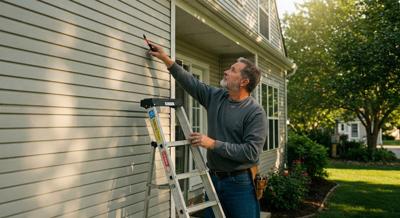
Do you have plans to revamp your home's exterior with a fresh look and added protection? New siding is a fantastic investment!
Seamless siding installation demands careful planning, quality materials, and accurate application.
Let's explore some crucial aspects to consider, empowering you with the knowledge to make informed decisions.
Careful Attention to Detail
Examine the outside of your house for rot, soft spots, weathered wood, cracks, and loose boards.
Next, clean the surface and remove old siding. You may need to remove exterior fixtures. Tree removal may be necessary if trees are intruding on the wall.
Sheathing and House Wrap
Beneath the siding, you'll find the sheathing; it's usually made of plywood and provides structural support. It should be solid and free from damage.
House wrap is a (breathable) water-resistant barrier that prevents moisture from seeping into the walls. It's necessary for preventing water damage, mold, and energy loss.
Furring Tips
Furring strips may be required.
These thin strips of wood create an airspace between the sheathing and the siding. Furring increases ventilation behind the siding, drying, and prevents moisture issues. It also provides a solid, level surface to attach the new siding.
Siding Material
Vinyl is the most popular option, primarily for its low-maintenance upkeep and wide range of colors. Wood has classic appeal but requires more upkeep. Fiber cement is fire-resistant and durable, while engineered wood lasts longer than regular wood.
Keep the following in mind:
Water resistance
Overall durability
The style of your home
Energy efficiency
Installation ease
Labor cost
When planning your siding installation, don't forget to consider the weather in your area—dry and cold conditions can significantly affect the outcome.
Siding Installation Methods
Accurate measurements are extremely important for seamless fit and proper alignment. This ensures a professional look and prevents gaps where water could seep inside.
Use corrosion-resistant screws or nails for long-term durability. Make sure they're the proper length to bore through the wall framing.
Siding materials also expand and contract with temperature changes. Leaving a small gap when nailing the siding allows for natural movement without buckling or warping.
Proper overlapping of siding panels and careful sealing of joints and corners are necessary for creating a watertight barrier. Your contractor should use proper flashing and sealants in these areas.
Siding can look crooked because of installation mistakes. Make sure the installation is level. Don't neglect sealing and flashing around windows and doors where water damage can occur.
Plus, keep drainage points clear for moisture control!
Trim and soffits aren't just decoration - they play a role in protecting your roofline. Make certain they are functional; they may have to be replaced before installation.
Now is a good time to inspect and perhaps even upgrade your insulation, as well.
Finding the Right Siding Contractor
Ask for referrals by calling on your network! Look online, and search for consistent reviews.
Ensure the contractor possesses the licenses necessary to operate in your area. This protects you and ensures they're qualified.
Don't immediately take the first estimate you're given. Shop around and ask multiple contractors to quote you their prices and services.
Read over the siding contract carefully. Make sure you understand the following:
The job being performed
The specific materials being used
The payment schedule
Warranty information
Extra fees
Don't hesitate to ask questions, either!
Your builder should be responsive to your questions from the initial consultation through completion of the job. Negotiate the estimated timeframe for completion and anticipate potential weather or unforeseen issues.
A quality contractor will have a plan for dismantling the old siding and removing debris in an eco-friendly way, with your land tidy and clean.
Start Your Project
Siding replacement is a vital investment that can make your home more valuable, protected, and energy-efficient.
By taking these crucial aspects into consideration and hiring a reputable contractor, you can enjoy the advantages for many years ahead.



(0) comments
We welcome your comments
Log In
Post a comment as Guest
Keep it Clean. Please avoid obscene, vulgar, lewd, racist or sexually-oriented language.
PLEASE TURN OFF YOUR CAPS LOCK.
Don't Threaten. Threats of harming another person will not be tolerated.
Be Truthful. Don't knowingly lie about anyone or anything.
Be Nice. No racism, sexism or any sort of -ism that is degrading to another person.
Be Proactive. Use the 'Report' link on each comment to let us know of abusive posts.
Share with Us. We'd love to hear eyewitness accounts, the history behind an article.